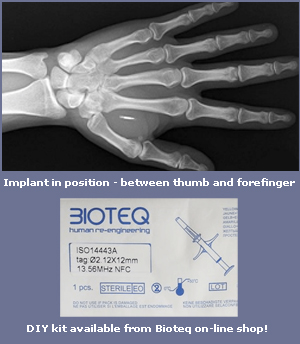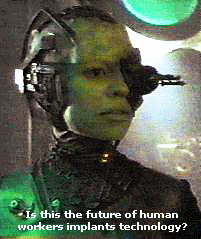In the 1980s, the editor of this website attended a Trade Union education course during which new technology was discussed. In this discussion, he put forward the idea that New Technology could be misused by immoral employers and that a way of tracking employees movements through the use of new electronic systems could be developed and used to determine for example the whereabouts of a specific worker at any one time in the premises in which they work.
 Fast forward some 30 odd years to November 2018, and the TUC issues the following press release with regard to the fact that some major UK companies are preparing to microchip their employees using the same technology implanted in household pets:
Fast forward some 30 odd years to November 2018, and the TUC issues the following press release with regard to the fact that some major UK companies are preparing to microchip their employees using the same technology implanted in household pets:
According to media reports, a Swedish company that provides human chip implants is in talks with UK legal and financial firms to implant staff in order to “boost security and stop them accessing sensitive areas” .
It’s since been reported that UK firm BioTech has already fitted 150 implants in the UK, including at some financial and engineering firms.
The news comes just weeks after the TUC published a report into surveillance at work.
It revealed over 50 per cent of workers think their employer is monitoring them at work – and that many feared new technology was going to make workplace monitoring even worse.
Workers were right to be paranoid
Trawling social media and tracking toilet breaks is bad enough, but the news on microchipping shows just how far some bosses are willing to go to control their workers.
We’d like to hear what security concerns could possibly justify the use of such technology on staff.
Because it’s hard to see how microchipping staff as we would our pets is the simplest, easiest and least intrusive way to guarantee company security.
And given each chip costs between £70 and £260 per person, microchipping is hardly justifiable on a cost basis either.
So what’s really going on here?
Well, microchipping would give bosses even more power and control over their workers.
Some employers are already making staff wear location-tracking devices.
Microchipping would allow them to monitor their every move even more accurately.
It could also be used to stockpile surveillance data on employees they don’t like, allowing bosses to micromanage staff out of the company.
And it would further erode dignity and right to privacy in the workplace.
We’ve already head stories of employees being forced to justify the length of their toilet breaks - and of female workers on their periods in Norway having to wear red bracelets to account for extra time.
And we know that some employers are also using facial recognition technology to record emotional reactions.
Such intrusive monitoring is likely to become more common with microchipping.
How have workers reacted?
Workers have expressed outrage on our social media feeds since the story broke last night.
It reminded many of Orwell’s dystopian novel 1984, where Big Brother watches every move people make.
They felt insulted that staff were being treated in the same way as household pets, with a microchip implant to make sure they don’t get ‘lost’ at work.
And they were furious that bosses were treating their employees are property rather than people. As one person rightly said:
“I’m a person, not a number”
We agree that asking people to be microchipped at work is a sinister step too far.
And there’s an obvious risk that this sort of technology could be misused and put workers in danger.
That’s why we want a requirement on employers to consult with staff before introducing any new forms of surveillance.
Employers must also justify such a move fully.
Clear workplace policies need to be negotiated with unions to set out where staff can use workplace technology for private use and where there are restrictions in place.
Intrusive surveillance undermines trust in the workplace by making people feel they’re always being watched.
So instead of microchipping their workforce, bosses need to start engaging with staff and unions to make new technology work for everyone.
 But the true extent of the problem was detailed in this report from The Guardian newspaper, reporting on the company Bioteq, based in Hampshire who are proudly promoting themselves as the leading 'Human technology implant specialists':
But the true extent of the problem was detailed in this report from The Guardian newspaper, reporting on the company Bioteq, based in Hampshire who are proudly promoting themselves as the leading 'Human technology implant specialists':
Alarm Over Talks To Implant UK Employees With Microchips
Trades Union Congress concerned over tech being used to control and micromanage
Britain’s biggest employer organisation and main trade union body have sounded the alarm over the prospect of British companies implanting staff with microchips to improve security.
UK firm BioTeq, which offers the implants to businesses and individuals, has already fitted 150 implants in the UK.
The tiny chips, implanted in the flesh between the thumb and forefinger, are similar to those for pets. They enable people to open their front door, access their office or start their car with a wave of their hand, and can also store medical data.
Another company, Biohax of Sweden, also provides human chip implants the size of a grain of rice. It told the Sunday Telegraph (£) that it is in discussions with several British legal and financial firms about fitting their employees with microchips, including one major company with hundreds of thousands of employees.
The CBI, which represents 190,000 UK businesses, voiced concerns about the prospect.
A CBI spokesperson said:
“While technology is changing the way we work, this makes for distinctly uncomfortable reading. Firms should be concentrating on rather more immediate priorities and focusing on engaging their employees.”
The TUC is worried that staff could be coerced into being microchipped.
Its general secretary Frances O’Grady said:
“We know workers are already concerned that some employers are using tech to control and micromanage, whittling away their staff’s right to privacy.
 Microchipping would give bosses even more power and control over their workers. There are obvious risks involved, and employers must not brush them aside, or pressure staff into being chipped.”
Microchipping would give bosses even more power and control over their workers. There are obvious risks involved, and employers must not brush them aside, or pressure staff into being chipped.”
Steven Northam, the founder and owner of Hampshire-based BioTeq, told the Guardian that most of its 150 implants have been for individuals, while some financial and engineering firms have also had the chips implanted in their staff.
BioTeq has also implanted them in employees of a bank testing the technology, and has shipped them to Spain, France, Germany, Japan and China.
They cost between £70 and £260 per person. Northam himself and all the directors at BioTeq and one of his other companies, IncuHive, have been microchipped.
Jowan Österlund, the founder of Biohax and a former body piercer, told the Telegraph that his microchips, which cost £150 each, could help financial and legal firms improve security.
“These companies have sensitive documents they are dealing with. [The chips] would allow them to set restrictions for whoever.”
Österlund said big companies, with 200,000 employees, could offer this as an opt-in. “If you have a 15% uptake that is still a huge number of people that won’t require a physical ID pass.”
Last year Wisconsin-based Three Square Market partnered with Biohax and became the first company in the US to microchip its employees, on a voluntary basis.
KPMG, one of the big four accountancy firms, said it was not planning to microchip its employees and “would under no circumstances consider doing so”.
Fellow accounting firms EY and PwC also said they would not consider microchipping their employees. Deloitte declined to comment.
Biohax has plans to open an office in London, according to its website. It claims 4,000 people have been microchipped, mostly in Sweden. It is working with the state-owned Swedish rail firm Statens Järnvägar, to allow its passengers to travel via chip implants rather than train tickets. Biohax did not respond to requests for comment.
But perhaps, this Bioteq web page is more appropriate for the Company to be saying as it promotes it's Orwellian ideas of how workers should be treated:

This is the Bioteq website error page when linking to their Incuhive page.
In a final twist though, it appears that workers are unknowingly distributing DIY packs of these 'human implants' via the Royal Mail.
As pictured at the top of this news item, these implants can be bought on-line direct from Bioteq themselves. Whilst the disclaimer reads:
WARNING: for professional medical use only. IMPLANTS ARE NOT intended FOR HUMAN implantation or USE. USE AT YOUR OWN RISK.
This is clearly intended to try to protect the company from misuse of the implants. But the question has to be asked - why else would these items be on sale, if not for the designed and intended use of implanting into human beings?
Source: TUC / The Guardian / Bioteq / unionsafety



 But the true extent of the problem was detailed in this report from The Guardian newspaper, reporting on the company Bioteq, based in Hampshire who are proudly promoting themselves as the leading 'Human technology implant specialists':
But the true extent of the problem was detailed in this report from The Guardian newspaper, reporting on the company Bioteq, based in Hampshire who are proudly promoting themselves as the leading 'Human technology implant specialists': Microchipping would give bosses even more power and control over their workers. There are obvious risks involved, and employers must not brush them aside, or pressure staff into being chipped.”
Microchipping would give bosses even more power and control over their workers. There are obvious risks involved, and employers must not brush them aside, or pressure staff into being chipped.”